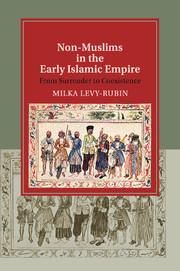Book contents
- Frontmatter
- Contents
- Illustrations
- Preface
- Introduction
- 1 The Roots and Authenticity of the Surrender Agreements in the Seventh Century
- 2 Shurūt ʿUmar and Its Alternatives
- 3 The Date and the Ideology of the Ghiyār Code
- 4 The Enforcement of Shurūt ʿUmar
- 5 The Provenance of the Modes of Subordination of Non-Muslims
- Conclusion
- Appendix I Al-Turtūshıī’s Version of Shurūt ʿUmar
- Appendix II Al-Shāfiʿıī’s Version of the Pact to Be Accorded to Non-Muslim Subjects
- Notes
- Glossary
- Bibliography
- Index
Conclusion
Published online by Cambridge University Press: 05 January 2012
- Frontmatter
- Contents
- Illustrations
- Preface
- Introduction
- 1 The Roots and Authenticity of the Surrender Agreements in the Seventh Century
- 2 Shurūt ʿUmar and Its Alternatives
- 3 The Date and the Ideology of the Ghiyār Code
- 4 The Enforcement of Shurūt ʿUmar
- 5 The Provenance of the Modes of Subordination of Non-Muslims
- Conclusion
- Appendix I Al-Turtūshıī’s Version of Shurūt ʿUmar
- Appendix II Al-Shāfiʿıī’s Version of the Pact to Be Accorded to Non-Muslim Subjects
- Notes
- Glossary
- Bibliography
- Index
Summary
The definition of the social and legal status of non-Muslims in Muslim society was a product of a long and complex process which began during Muhammad’s lifetime and found expression in his various, inconsistent, statements regarding ahl al-kitāb to be found in the Qurʾān, as well as in the early surrender agreements that were signed in his lifetime. It was, however, during the conquests made from 634 CE onwards, when city after city fell into the hands of the Muslim conquerors, that they began to adopt a more consistent policy based on the sulhan/ʿanwatan principle – the sulhan, in its turn, being based on the amān, or promise of security given in exchange for the payment of tax by the conquered inhabitants. This basic code was applied, according to Muslim historiographic tradition, with some additional conditions and commitments that were applied at times and varied from one place to another. Muslim sources dating from the end of the eighth century CE onwards often adduce reports regarding these surrender agreements, and at times include versions of the agreements themselves.
As demonstrated in the first chapter, such codes were in fact part of an ancient diplomatic tradition, customary in the ancient Near East from the middle of the second millennium BCE. Written treaties in general, and written surrender agreements in particular, are to be found in the ancient Near East, as well as in the Graeco-Roman world, and in the Byzantine empire, its successor. Such agreements were specific and detailed, and included – besides major issues such as personal security and the safeguarding of possessions, prayer-houses, ritual and customs in return for the payment of tax – such minute details as the manner and duration of the evacuation of a certain territory, the number of hostages taken in order to assure fulfilment of all the clauses, etc. There was a common international diplomatic terminology for use in the drafting of these documents.
- Type
- Chapter
- Information
- Non-Muslims in the Early Islamic EmpireFrom Surrender to Coexistence, pp. 164 - 170Publisher: Cambridge University PressPrint publication year: 2011



